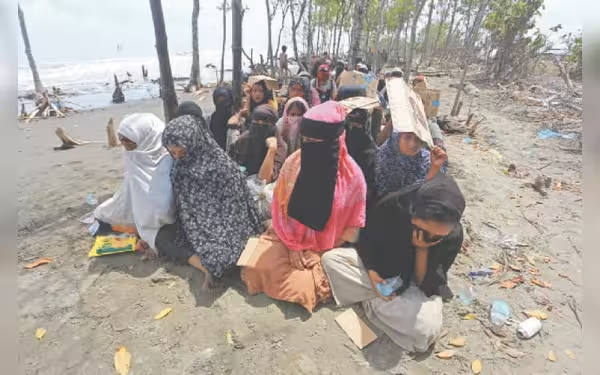Thursday, November 7, 2024 10:13 AM
Rohingya Refugees Arrive in Indonesia, Six Confirmed Dead
- Six bodies found as Rohingya refugees land in Indonesia.
- Over 150 Rohingya arrive in Aceh this month.
- Human trafficking highlighted as a major issue.
 Image Credits: dawn
Image Credits: dawnSix Rohingya refugees found dead as over 150 arrive in Indonesia, highlighting the ongoing humanitarian crisis and human trafficking issues.
The plight of the Rohingya people, a persecuted Muslim minority from Myanmar, has drawn international attention due to their desperate attempts to escape violence and discrimination. Each year, thousands of Rohingya risk their lives on perilous sea journeys, often crammed into overcrowded and unsafe boats, in hopes of reaching safer shores in countries like Malaysia and Indonesia. The recent arrival of a boat carrying Rohingya refugees in Indonesia has once again highlighted the ongoing humanitarian crisis faced by this community.
On Thursday, a group of Rohingya refugees, including women and children, landed on the shores of East Aceh province in Indonesia. Tragically, six bodies were discovered nearby, underscoring the dangers associated with these treacherous journeys. Local officials reported that the refugees were abandoned by human traffickers before dawn, approximately 100 meters from the beach. The group consisted of 46 women, 37 men, and seven children, all of whom were left stranded on the beach.
According to Saiful Anwar, a village official, the refugees were found around 4 a.m. and were still waiting for assistance at the local beach. Miftach Tjut Adek, the chief of the community, confirmed that eight sick refugees were taken for medical treatment, while the remaining individuals were kept in tents on the beach until authorities could provide shelter. The UN Refugee Agency (UNHCR) acknowledged the arrivals but stated that they could not provide further information at this time.
Acting Aceh Governor Safrizal attributed the situation to the activities of human trafficking mafias, emphasizing the need for regional cooperation to address the issue. This incident marks the third group of Rohingya arrivals in western Indonesia this month, with over 150 refugees landing in Aceh and another 140 in North Sumatra province. The ongoing crisis has raised concerns about the safety and well-being of these vulnerable individuals.
Every year, thousands of Rohingya embark on the dangerous 4,000-kilometer journey from Bangladesh to Malaysia, often facing harrowing conditions at sea. Indonesia, while not a signatory to the UN refugee convention, has been called upon to share the burden of these arrivals. Many locals in Aceh, who have their own memories of conflict, express sympathy for the Rohingya, yet some residents are growing weary of the continuous influx of refugees.
In the past year alone, over 2,000 Rohingya arrived in Indonesia, a significant increase compared to previous years. The UNHCR has urged the Indonesian government to ensure the safety of these refugees and has been working alongside local authorities to provide necessary aid. As the seas calm between October and April, more Rohingya are likely to attempt the journey, seeking refuge from the dire conditions in Myanmar.
The situation of the Rohingya serves as a stark reminder of the ongoing humanitarian crises around the world. It calls for a collective response from nations to address the root causes of such displacement and to provide safe havens for those fleeing persecution. As the international community grapples with these challenges, it is crucial to remember the human stories behind the statistics and to advocate for the rights and dignity of all individuals, regardless of their background.













